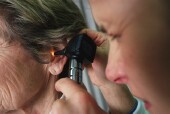- 8 Ways to Increase Dopamine Naturally
- 7 Best Breads for Maintaining Stable Blood Sugar
- Gelatin vs. Collagen: Which is Best for Skin, Nails, and Joints?
- The Long-Term Effects of Daily Turmeric Supplements on Liver Health
- Could Your Grocery Store Meat Be Causing Recurring UTIs?
- Are You Making This Expensive Thermostat Error This Winter?
- Recognizing the Signs of Hypothyroidism
- 10 Strategies to Overcome Insomnia
- Could Artificial Sweeteners Be Aging the Brain Faster?
- Techniques for Soothing Your Nervous System
See Doctor Before Buying Hearing Aid, FDA Advises


WEDNESDAY, Nov. 20Feel like you’re losing your hearing? It’s important to see a doctor before you start looking for a hearing aid or amplifier, the U.S. Food and Drug Administration says.
“The problem might be as simple as a wax impaction blocking the ear canal, which is easily treated, or at the other end of the spectrum, it could be something as serious as a tumor pressing on the hearing nerve,” Dr. Eric Mann, clinical deputy director of the FDA’s division of ophthalmic, and ear, nose and throat devices, said in an agency news release.
Many cases of hearing loss are related to aging and exposure to loud noises, and a hearing aid might be the solution. While a prescription is not required for most kinds of hearing aids, it’s wise to see a health care professional to rule out other medical causes of hearing loss, and to ensure that hearing aids are properly fitted and come with follow-up care.
Your primary care doctor may refer you to an ear, nose and throat specialist — an otolaryngologist — for evaluation and diagnosis of hearing loss, the FDA said. It also noted that two types of hearing health professionals are authorized to measure hearing loss and dispense hearing aids:
- Audiologists, who must have at least a master’s degree and specialized training in hearing loss.
- Hearing aid dispensers, who are licensed by states under varied requirements.
Consumers shouldn’t deal with businesses that say there is no need for a medical exam before buying a hearing aid.
If you’re shopping for a hearing aid, the FDA says you should:
- Find a licensed hearing aid professional who offers products from several manufacturers.
- Ask whether there is a trial period. Most states require 30-60 day trial periods. Find out what exactly is refundable if you return the hearing aid during the trial period.
- Examine the details of the warranty, including whether you’ll get a free loaner if your device needs serving and repair.
- Check whether the price quoted includes testing and follow-up services.
More information
The U.S. National Institute on Deafness and Other Communication Disorders has more about hearing aids.
Source: HealthDay
Copyright © 2026 HealthDay. All rights reserved.










